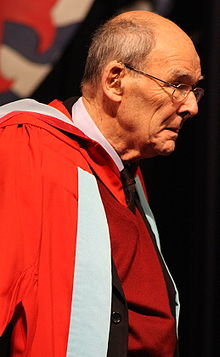David Armstrong
David Malet Armstrong (born July 8, 1926 in Melbourne , Australia , † May 13, 2014 in Sydney ) was an Australian philosopher and professor at the University of Sydney . His main areas of work were philosophy of mind , ontology and philosophy of science . Armstrong advocated reductive physicalism .
Life
Armstrong was the son of Commodore JMArmstrong, who served in the US Navy. After attending school in Oxford and Australia as well as military service in the Australian Navy (1945/46), Armstrong studied philosophy at the University of Sydney from 1947. He graduated with honors in 1950. In 1950 he married Madeleine Annette Haydon. This was followed by postgraduate studies at Oxford University from 1952 to 1954. He then worked as a lecturer at London University in 1954/55 . In 1956 he went back to Australia and taught at Melbourne University (1956–1963). There he obtained his PhD in 1960 . From 1964 he was a professor at the University of Sydney until his retirement in 1992. He married Jennifer Mary de Bohun Clark in 1982. Armstrong was visiting professor at Stanford University , University of Graz , University of Notre Dame and Yale University , among others . On December 13, 2007 he was awarded the Doctor of Letters (hc) from the University of Nottingham, England. He was also elected a corresponding member of the British Academy in 1998 and an honorary foreign member of the American Academy of Arts and Sciences in 2008 .
plant
A central element in Armstrong's work is his universal realism . This states that, in addition to objects , there are also properties as respectable, fundamental entities . However, Armstrong imagines these to be dependent on objects in the sense that they cannot exist independently of them. Armstrong's main reason for the adoption of universals is what he called the truth maker principle ( truthmakers principle ): For each contingent truth , there must be something that makes them true. So there must be properties that make the facts about properties true.
The ontology of fundamental objects and properties, always physical for Armstrong, is intended to describe what really exists in a strong, realistic sense . This also applies to natural laws , which Armstrong understands as relations between universals. In doing so, he distances himself from legal conceptions in the tradition of David Hume , who want to reduce natural laws to regularities.
Armstrong is also considered to be one of the most important representatives of reductive materialism in the philosophy of mind. He represented an identity-theoretical position in the tradition of John Smart and Ullin Place .
Fonts
Books
- Berkeley's Theory of Vision: A Critical Examination of Bishop Berkeley's Essay towards a New Theory of Vision. Melbourne University Press, Melbourne 1960.
- Bodily Sensations. Routledge & K. Paul, London 1962.
- Perception and the Physical World. Routledge & K. Paul, London 1961, ISBN 0-7100-3603-5 .
- A Materialist Theory of the Mind. Routledge & K. Paul, London 1968, ISBN 0-415-10031-3 .
- Belief, Truth and Knowledge. Cambridge University Press, London 1973, ISBN 0-521-08706-6 .
- Universals and Scientific Realism. Cambridge University Press, Cambridge 1978, ISBN 0-521-21741-5 .
- The Nature of Mind and Other Essays. Cornell University Press, 1981, ISBN 0-8014-1353-2 .
- What is a Law of Nature? Cambridge University Press, Cambridge 1983, ISBN 0-521-25343-8 . (German: What is a law of nature? Translated from English by Wolfgang Sohst , Xenomos, Berlin 2004, ISBN 3-936532-32-X .)
- A Combinatorial Theory of Possibility. Cambridge University Press, Cambridge 1989, ISBN 0-521-37427-8 .
- Universals: An Opinionated Introduction. Westview Press, Boulder, CO 1989, ISBN 0-8133-0772-4 .
- A World of States of Affairs. Cambridge University Press, Cambridge 1997, ISBN 0-521-58064-1 . (German: Sachverhalte, Sachverhalte . Translated from English by Wolfgang Sohst, Xenomos Berlin 2004, ISBN 3-936532-33-8 .)
- The Mind-Body Problem: An Opinionated Introduction. Westview Press, Boulder, CO 1999, ISBN 0-8133-9056-7 .
- Truth and Truthmakers. Cambridge University Press, 2004, ISBN 0-521-83832-0 .
- Sketch for a Systematic Metaphysics. Oxford University Press, 2010, ISBN 0-19-959061-3 .
items
- Is Introspective Knowledge Incorrigible? In: Philosophical Review. 72, 1963, pp. 417-432.
- Meaning and Communication. In: Philosophical Review. 80, 1971, pp. 427-447.
- with Peter Forrest: An Argument against David Lewis' Theory of Possible Worlds. In: Australasian Journal of Philosophy. 62, 1984, pp. 164-168.
- Classes are States of Affairs. In: Min. 100, 1991, pp. 189-200.
Web links
- Literature by and about David Armstrong in the catalog of the German National Library
- Vita and bibliography
- Maya Eddon: Armstrong on Quantities and Resemblance (PDF; 2.4 MB), Philosophical Studies 136 (2007) 385-404
- Daniel von Wachter : David Armstrong , in: Information Philosophie 5/2002, pp. 24–29 (PDF; 46 kB)
- Daniel von Wachter: How to Misunderstand David Armstrong's Theory of Possibility (PDF; 106 kB)
- Professor David Armstrong - obituary. Obituary in The Daily Telegraph, July 9, 2014
Individual evidence
- ^ Deceased Fellows. British Academy, accessed April 30, 2020 .
| personal data | |
|---|---|
| SURNAME | Armstrong, David |
| ALTERNATIVE NAMES | Armstrong, David Malet (full name) |
| BRIEF DESCRIPTION | Australian philosopher and professor at the University of Sydney |
| DATE OF BIRTH | July 8, 1926 |
| PLACE OF BIRTH | Melbourne , Australia |
| DATE OF DEATH | May 13, 2014 |
| Place of death | Sydney |
